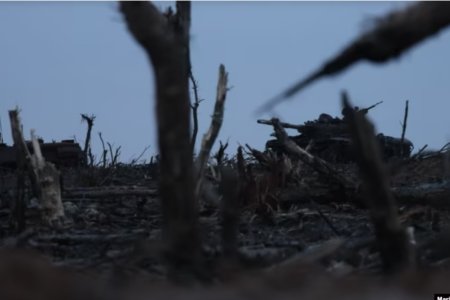
Yevhen Roman not only witnessed, but was also a victim, of Russia’s gunning down of Ukrainian prisoners of war who have laid down their weapons and surrendered. Unlike four of his fellow soldiers who were shot and killed, he survived and is able now to provide crucial testimony about this undoubted war crime.
Now 41, Roman volunteered for military service shortly after Russia’s full-scale invasion of Ukraine and was part of the Ukrainian Armed Forces 5th Assault Brigade. He and four other defenders were captured by the Russians on 14 March 2023 in the village of Ivanivske, near Bakhmut.
Russia used both Wagner Unit mercenaries and military servicemen for its huge assault on Bakhmut, with no consideration for its own losses. Roman explains that he had lost consciousness after an explosion in the morning of 14 March 2023, and only came too around six hours later, when it was already dark. Three Russians appeared, pointing machine guns at Roman and the four other men, and ordering them to remove their bullet-proof vests. The Russians demanded to know what they were doing, to which one of the young Ukrainian soldiers responded that they were on their own land and were defending it. It was after this the five soldiers laid down their weapons and surrendered. “The guys went out first, without weapons. When a machine gun is pointed at your head, you don’t take anything with you. You come out because you know that this is captivity.”
It should have been captivity, with the men all protected under international law as prisoners of war. Instead the first four Ukrainian soldiers who came out first were gunned down. Roman came next but was also shot. He was, however, saved by the fact that in the dark the Russians had earlier not noticed that he had not removed his bullet-proof vest. Bullets caused injuries to his arms but, thankfully, did not burst any blood vessels.

He did not hear any order to shoot the prisoners of war and says that of the three Russians, it was the one who was older, around 50, who opened fire from his automatic rifle. Roman fell together with the other men, and the Russians clearly did not realize that he was still alive. He is clear that the Russians were guilty of a war crime. He does, however, note that the Russian who opened fire, received his ‘punishment from God’ almost immediately. Three to four minutes after the shooting, the Russians were themselves struck by mortar fire, with the older man’s leg blown off. Roman recalls that the Russian was lying close to the Ukrainians he had killed, and to Roman. He was screaming and pleading for help, but none of the Russian soldiers even tried to go up to him.
Roman says that he waited until it seemed quiet, and got up. There were, however, Russians around 30 metres away. One of them saw him, and he waved his arms and fell forward to the ground. He adds that he heard the man telling his commander by walkie-talkie that there was a “300” (a wounded POW) there. Fortunately, the commander said to leave him, that he’d die anyway.
The Russians themselves were killed by a drone attack. The following day, while the Ukrainian Forces were shelling the enemy, Roman managed to crawl, on his knees, to the Ukrainians position. He says that he has no idea where he found the strength to try to get out, but mentions that he prayed constantly. “During war, there are no tears, but there’s no way forward without prayer”.
After being evacuated from the front, Roman underwent operations and spent a long time in hospital, recovering from his injuries. He still has problems with any heavy physical loads and continues to be tormented by the memory of his comrades being gunned around him.
Russian soldiers have been guilty of killing Ukrainian prisoners of war since the beginning of the full-scale invasion of Ukraine with the first such crimes recorded in both Chernihiv and Kharkiv oblasts in March 2022. In the Chernihiv case, a Russian was even convicted and sentenced to life imprisonment.
Since November 2023, there has been a dramatic increase in the number of killings of Ukrainian POWs. Since the cases are occurring in quite different parts of the front, it seems likely that they are an indication of Russian policy, supported by the top echelons of Russia’s armed forces. In talking about such killings in February 2024, Yury Bielousov, the head of the Prosecutor General’s Department on countering crimes committed during the armed conflict, pointed to the fact that videos showing such executions are so often posted by Russians. “The publication of such videos is an attempt to demoralize Ukrainian soldiers, to weaken their resistance and to generally make it easier to subjugate Ukraine. This is once again evidence that it is a part of the Russians’ general plan of general and destruction of the Ukrainian people.”
He noted then that if the Russian military leadership wanted to stop such war crime killings of POWs, they could, and suggested that in fact, they are probably providing direct orders to carry them out.
In fact, proof of this, at least at the level of individual assault groups, has since emerged, as has even more evidence of horrific crimes involving not only the gunning down of Ukrainian defenders who have surrendered, but even the beheading of one soldier.
See:
UN records 32 summary executions by Russia of Ukrainian prisoners of war since December



